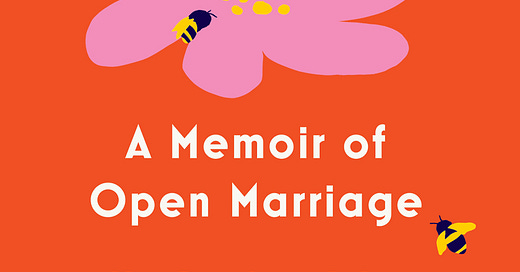Just six little weeks ago, when I wrote my first Substack post about publishing a deeply personal memoir of open marriage, I quoted a friend as saying: “This book coming out is like you’re heading into the spotlight—but without any clothes on.” That image resonated with me. But now that MORE has received some actual media attention, I realize that this experience is quite different than what I expected. As it turns out, I’m not in the spotlight at all—but my doppelganger is.
Naomi Klein’s most recent book, Doppelganger: A Trip into the Mirror World,* grew out of her experience of being confused with another Naomi—Naomi Wolf—who Klein regards as her troublesome double. But as Klein writes in the introduction, her book goes beyond this Tale of Two Naomi’s, becoming instead “a guide into and through what I have come to understand as our doppelganger culture.”
Take, for example, social media. From personalized avatars to carefully curated public-facing personas, many of us have indeed adopted a digital doppelganger. Klein speaks of a three-step process—partition, perform, project—to explain how this doubling in social media is achieved. First, we partition ourselves into a “perfected” self and an “abject” self. The former is the performative persona we present to the world; but we still must deal with the latter. Similar to Jung’s “shadow self,” (see my previous Substack ), we “project the unwanted and dangerous parts of [ourselves] onto others (the unenlightened, the problematic, the deplorable, the ‘not me’ that sharpens the borders of the ‘me’).” If you’ve been on Twitter (or Reddit. Or Facebook. Or Instagram) in the past decade, you know what Klein is talking about.
The idea of doubling oneself is not only true in social media, however. It’s also very true in memoir. The Molly in MORE is, in effect, my doppelganger, standing in for the “real” me rather than fully embodying every facet of my being. Because the book covers a span of ten years, I could not possibly include every action I’ve ever taken, every thought I’ve ever had. (Even My Name Is Barbra, weighing in at almost 1,000 pages, had to leave out Streisand’s 2nd favorite Swanson’s TV dinner.) What’s more, my doppelganger is frozen in time. MORE ends on a somewhat bleak day in February, 2018. As I wrote the book, I certainly brought to bear the wisdom I gained in subsequent years on my prior experiences, but I also tried to stay true to what I did and did not understand during that time. In an effort to prevent any overt editorializing from an older (hopefully wiser) vantage point, I wrote the book in the present tense. Readers will assess Memoir Molly’s progress up until that point and decide how far she has or hasn’t come. And I (Real Molly)—despite the growth or progress I hope I’ve made in the six years since that moment—will have to let them.
But this is okay. Because the objective of memoir is quite different than that of social media. Rather than partition and perform in an exalted state, the job of the memoirist is to probe deep into the underbelly of one’s life. And projecting into a mirror doesn’t get you very far. As Mary Karr writes in The Art of Memoir, “In some ways, writing a memoir is knocking yourself out with your own fist, if it’s done right…. [M]emoir wrenches at your insides precisely because it makes you battle with your very self—your neat analyses and tidy excuses.” No reader is interested in the flattering poses adopted by the performative self. Readers want memoirists to show their fullest, truest natures—the bad and the ugly much more than the good.
So now, I am one week away from MORE’s publication date. (Gulp.) I’ve resigned myself to the idea that some readers will deem the Molly they meet in the pages I’ve written as a flawed and problematic person. This might sting a little, but ultimately, it’s fine. In fact, it might even mean that my doppelganger and I have done a pretty good job of representing the truth.
*Special thanks to my wonderful (and wonderfully literary) friend, Emily, for giving me Doppelganger for my birthday!




Love this line "the job of the memoirist is to probe deep into the underbelly of one’s life. "